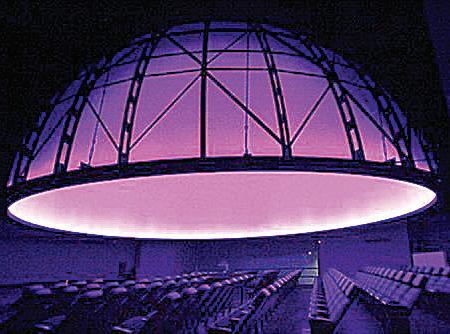
9 minute read
COVER STORY
Looking up! Seeing the beauty of the night sky
By Mark Woolsey
Advertisement
Say the idea of looking at the mountains, craters and shadows of the moon gets your interest. Perhaps a distant and colorful nebula inspires awe and wonder. Or maybe the prospect of checking out Saturn and its rings-hanging like a jewel in space-gives you goosebumps.
You just might be a future amateur astronomer.
Several observatories in Georgia, most of them associated with academic institutions, offer observation and research opportunities for students and others seeking astronomical knowledge/ degrees and almost all throw open the doors to the public during non-pandemic times.
But what’s more, a healthy number of amateurs-seniors well-represented among them-are increasingly taking astronomy up as a hobby, sometimes spending thousands of dollars on gear. The goastronomy. com and Middle Georgia Astronomical Society websites together list nearly a dozen sky-scanning clubs in the state
Experts caution that budding cosmologists will need a healthy dollop of patience-and advance planning as well. But the rewards for being deliberate are spectacular. “The most common reaction is ‘wow,’” said David Dundee, a genial 60-ish astronomer who presides over the 20-inch telescope and observatory at the Tellus Science Museum in Cartersville (along with its associated planetarium). The observatory has opened with social distancing and safety measures during the pandemic, unlike most others. Their 120-seat planetarium also is open on a limited basis for sky shows.
“The most important thing is the ability of a person to come here and put their eye to the telescope and say ‘I can see the rings of Saturn or ‘I am looking up at the Orion nebula,’ “ Dundee said. “To me that’s so much better than being at home (at a computer) and punching buttons and up come pictures.”
He said the most popular viewing targets are the moon, Mars and Saturn, as well as Orion and other nebulae (which are giant gas and dust

clouds far away in space). The Andromeda galaxy, star clusters and lunar and solar eclipses also find favor.
“You can call them the greatest hits of space,” he said with a grin.
Tellus volunteer, amateur astronomer and retired chemist Bob Gossman said his interest in the heavens flickered to life while viewing astronaut Ed White’s groundbreaking Gemini 4 spacewalk in 1965. “I excitedly woke my parents and they told me to go back to bed,” he recalled and told of a similar, much more recent epiphany.
During a public program one night he coaxed a frazzled mother riding herd on her kids into taking a look through the eyepiece. Saturn and its rings held center stage.
When she looked herself, she was so surprised by what she saw that she yelled an obscenity, Dundee recalled. Then she was embarrassed because she had blurted the words in front of her kids. “I asked her to describe what she was seeing,” he said, “and her voice began cracking. She was tearing up.”
The modest masonry, brick and steel-girder observatory at Tellus has a 20-inch telescope that looks a bit like a planetary probe. More compact and lighter than its predecessors, two people can lug it into place and perch it on its mount.
Once the telescope is in position and darkness falls, families of all sizes and shapes – including a healthy contingent of seniors – make their way to the campus. Before the COVID-19 pandemic, Dundee said, the domed building about 10,000 visitors a year. This year is different, he said, because the observatory was shut down for weeks.
What’s more, he said, “this is a big date night location.” Recently a group of teenagers celebrating a birthday showed up. During public nights, smaller telescopes set up near the observatory and volunteers with laser pointers spotlight highlights of the heavens. The Tellus telescope is a 20inch reflector utilizing mirrors. Refracting telescopes, by contrast, use lenses. Each has advantages and disadvantages, said Gossman. A refracting telescope is typically cheaper and a bit brighter, while a reflecting device can gather more light with a more compact design.
Dundee said novices might think magnification is most crucial, “but the name of the game in astronomy is aperture. The bigger the telescope, the more light it can gather up and the fainter the objects you can see.”
Those who are newly interested in the moon, planets and stars can start out in a more uncomplicated way.
“Astronomy is like most hobbies,” said Dr. Greg Feiden, assistant astronomy professor at the University of North Georgia and the director of their observatory, which recently was rebuilt and which uses 24-inch and 28-inch telescopes. “You can spend as much or as little as you want on equipment. It can be completely free as you walk out and take a look at the night sky.”
An inexpensive star chart can make sense of the constellations. For somewhat more, a pair of sturdy binoculars costing less than $100 can bring the brighter celestial objects into view, astronomers said.
Feiden guestimates that about 20 percent of the observatory’s visitors during normal times (it’s closed to the public now) are seniors. He thinks that proportion may increase with their new facility, which includes a lift to take visitors up to the observation
continued on page 6
SPECIAL Astronomer David Dundee looks after the observatory and planetarium at the
Tellus Observatory.

continued from page 5
deck and a periscope that can bring an eyepiece down as low as the 3-foot level.
For those doing their own viewing, patience pays off, Gossman stressed. He advises taking time to let your eyes adjust and utilizing peripheral vision to spot additional objects like planetary moons.
He advises people with home gear to adjust their “finderscopes,” an aiming device, and align them with the main telescopes during the day. After dark, he noted, getting one’s celestial bearings can
Places where you can observe the night sky

The Tellus Science Museum in Cartersville is open for public viewings with safety and social distancing requirements in place. Their planetarium is also open on a limited basis. Their planetarium is also open on a limited basis. Here are some other places in north Georgia where you often can find public events that allow you to study the night sky. Because of the COVID-19 pandemic, many now are closed to the public, but say they plan to reopen. Check their webpages for more up-todate information. The University of Georgia observatory in Athens is closed and no date has been set for a reopening. The University of North Georgia astronomical observatory in Dahlonega is listed as closed due to its transition into a new facility as well as COVID-19 concerns and aims for to re-open in early 2021.
Georgia State University’s Hard Labor Creek observatory
east of Atlanta has eliminated open houses until further notice due to COVID-19. The same applies to the observatory on their Dunwoody campus. Bradley Observatory at Agnes Scott College in Decatur is closed until further notice.
The Ralph Buice Jr. Observatory at Fernbank Science Center
in DeKalb County is closed and aims to reopening for viewing opportunities around the first of the year.
— Mark Woolsey
take a while even with advance planning and fancier computercontrolled systems.
For astrophotographers, taking one’s time is especially a virtue. Jim Ribble of Forsyth County, a retired broadcaster, has shot hundreds of pictures of the sky and said with fainter objects gathering the needed light and software processing can take hours.
“I enjoy the challenge” he said, “of pointing the telescope to a dark part of the sky and realizing that that it’s filled with incredible, colorful objects.”
At Tellus, Dundee wonders s whether renewed interest in the space program, with a return to the moon and a mission to Mars now in the planning stages, has jumpstarted recent interest in the night skies.
“I think any manned missions to space excite the general public. The Hubble space telescope and the robotic missions are exciting, but when you start including human brains in the exploration, it’s a whole different story.”

Back on Earth, increasing light pollution and Georgia’s typical summertime heat and humidity pose issues. “We are destroying the sky with useless lights,” is how Ribble puts it. Dundee said such pollution has increased greatly in recent years as metro Atlanta has surged northward.
Georgia State University’s Dr. Sebastien Lepine, who chairs the physics and astronomy department, said the school’s observatory at Hard Labor Creek likewise grapples with the issue. He suggests getting at least 30-50 miles away from downtown Atlanta for better views, or perhaps climbing Stone Mountain. Likewise, he said, spotting the bands of the Milky Way are a well-outsidethe-city experience.
For those willing to travel, Stephen C. Foster State Park in
South Georgia is a designated “dark sky” area, according to astronomy.com. Those come with lighting restrictions. And in general, the areas with the darkest skies are well west of the Mississippi, particularly in the southwest.
Those skies seemingly hold almost universal appeal for the public-as well as astronomers, whose painstaking, careful work sometimes keeps them up until nearly dawn.
“It’s rare you come across somebody who says, ‘Yuck I don’t like the stars.’”. Dundee said. “Everybody appreciates the beauty of the sky.”

A network of doctors who care about you as a patient, and as a person. That’s human care.

Care that’s centered on you is nearby.
7 care centers located near you.
Belvedere
Iora Primary Care 3527 Memorial Dr., Unit W Decatur, GA 30032
Shiloh Square
Iora Primary Care 3895 Cherokee St. NW., #400 Kennesaw, GA 30144
Mableton
Iora Primary Care 5015 Floyd Rd. SW., Ste. 710 Mableton, GA 30126
Sugarloaf
Iora Primary Care 4850 Sugarloaf Pkwy, Ste. 101 Lawrenceville, GA 30044
Marietta
Iora Primary Care 280 Cobb Pkwy SE., Ste. 60 Marietta, GA 30060
Tucker
Iora Primary Care 4424 Hugh Howell Rd., Ste. D Tucker, GA 30084
Metropolitan
Iora Primary care 2685 Metropolitan Pkwy SW., Ste. G Atlanta, GA 30315
Take a virtual tour at
IoraIsHere.com
Learn more about the unique kind of care in Humana’s network at HealthThatCares.com. Or contact your local licensed Humana Sales Agent at 1-844-224-8993 (TTY: 711). ¿En español? Llame gratis al 1-844-357-9121 (TTY: 711).
Humana is a Medicare Advantage HMO, PPO and PFFS organization with a Medicare contract. Enrollment in any Humana plan depends on contract renewal. Other Providers are available in our network. Provider may also contract with other plan sponsors. Important! At Humana, it is important you are treated fairly. Humana Inc. and its subsidiaries comply with applicable Federal Civil Rights laws and do not discriminate on the basis of race, color, national origin, age, disability, sex, sexual orientation, gender, gender identity, ancestry, marital status or religion. ATTENTION: If you do not speak English, language assistance services, free of charge, are available to you. Call 1-844-224-8993 (TTY: 711). Español (Spanish): ATENCIÓN: Si habla español, tiene a su disposición servicios gratuitos de asistencia lingüística. Llame al 1-844-357-9121 (TTY: 711). 繁體中文 (Chinese): 注意:如果您 使用繁體中文 ,您可以免費獲得語言援助服務 。請致 電 1-844-224-8993 (TTY: 711) 。 Y0040_GHHKTYSEN_M










